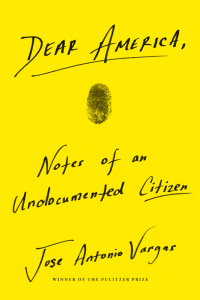Take a photo of a barcode or cover
I’ll never rate a memoir anything less than 5 stars but wow. This one hit a little too close to home.
informative
medium-paced
Non-fiction isn’t usually my genre of choice, but I read this hoping to find a replacement text for my migration literature unit. While I don’t think it’s a good fit for my class, I actually enjoyed the read more than I expected.
First, what I didn’t like: Vargas is a journalist, and this book reads like a journalist wrote it. It’s densely packed with history, statistics, and information, to the point where it gets hard to track the narrative flow (especially because Vargas skips forward and backward through time). While it was informative, I felt that the storytelling was lacking. This is the main reason why I wouldn’t teach this book - I think 9th graders would struggle to track the plot and stay engaged.
However, the moments where Vargas wrote more personally and vulnerably were very powerful. I would have liked these scattered anecdotes to be a bit more cohesive, but they stood alone well, too. I also appreciated Vargas’s overall balanced tone and reflections on how important it is to be able to work across the aisle on important issues like immigration policy.
First, what I didn’t like: Vargas is a journalist, and this book reads like a journalist wrote it. It’s densely packed with history, statistics, and information, to the point where it gets hard to track the narrative flow (especially because Vargas skips forward and backward through time). While it was informative, I felt that the storytelling was lacking. This is the main reason why I wouldn’t teach this book - I think 9th graders would struggle to track the plot and stay engaged.
However, the moments where Vargas wrote more personally and vulnerably were very powerful. I would have liked these scattered anecdotes to be a bit more cohesive, but they stood alone well, too. I also appreciated Vargas’s overall balanced tone and reflections on how important it is to be able to work across the aisle on important issues like immigration policy.
Quick, poignant, and powerful, Jose Antonio Vargas—Filipino, millennial, founder of the non-profit, Define American, and undocumented immigrant—uses his story, brought to readers in small autobiographical vignettes, to shed light on the helpless and often hopeless situations that those in his shoes find themselves in.
The book, while striking me at times as amateurish (by way of a few grammatical errors and a sometimes-shallowish delivery), does much more important work than I was originally expecting. Everything, from Vargas’s experience with other undocumented immigrants, to his own circumstances of arrival—which he had no control over—to his own discovery of himself as a gay man and a “non-citizen” citizen of a nation that looks on him with disdain, really gives readers a sense of what it must be like to be a part of a haphazard third culture, traversing the difficulties of not quite belonging while yet knowing home as so much more than where one happens to be born.
Vargas explores and lays out the hopeless entanglement of the “immigration system,” and how it got to where it is today in personable, easy-to-read ways. In addition, he tells a remarkable personal story of those who rose to his occasions: those who have been allies and those who have been adversaries in his journey as a famed Pulitzer Prize-winning journalist trying to get the nation he loves and fears to see the true nature and trials of immigrants today.
The book, while striking me at times as amateurish (by way of a few grammatical errors and a sometimes-shallowish delivery), does much more important work than I was originally expecting. Everything, from Vargas’s experience with other undocumented immigrants, to his own circumstances of arrival—which he had no control over—to his own discovery of himself as a gay man and a “non-citizen” citizen of a nation that looks on him with disdain, really gives readers a sense of what it must be like to be a part of a haphazard third culture, traversing the difficulties of not quite belonging while yet knowing home as so much more than where one happens to be born.
Vargas explores and lays out the hopeless entanglement of the “immigration system,” and how it got to where it is today in personable, easy-to-read ways. In addition, he tells a remarkable personal story of those who rose to his occasions: those who have been allies and those who have been adversaries in his journey as a famed Pulitzer Prize-winning journalist trying to get the nation he loves and fears to see the true nature and trials of immigrants today.
emotional
informative
inspiring
reflective
slow-paced
I’ve admired Vargas and his willingness to tell his story for many years. This book is accessible for those wanting to understand the complexity and incomprehensibility of the US immigration system. Every immigration story is unique, which he points out, but there are patterns that should wake up those of us who have citizenship to change the system for the better.
In matters that are divisive, we must arm ourselves with knowledge so that we can contribute to the conversation intelligently. Dear America is an important shoot among the tangled branches of immigration.
Divided into three parts, the first part of Jose’s story about his early years in the Philippines and then later in the US was, for me, the most compelling. Learning that he arrived as a child in California with less than stellar paperwork while coming to terms with his sexuality must have been incredibly difficult as a young 16 year old. I felt for him in a way that I didn’t in the last two parts of the book, and can see how he still struggles with letting down his guard, letting people in. The last two sections he write more as a journalist, as he is trained to do, but I didn’t sign on to an article. He tried to be as open as he could in his memoir, but we seasoned memoir readers demand more. I felt that there was so much more he kept hidden during his adult years.
Regardless, Dear America is a must-read. Who is truly ‘American.?’ Why do we label people illegal?
Divided into three parts, the first part of Jose’s story about his early years in the Philippines and then later in the US was, for me, the most compelling. Learning that he arrived as a child in California with less than stellar paperwork while coming to terms with his sexuality must have been incredibly difficult as a young 16 year old. I felt for him in a way that I didn’t in the last two parts of the book, and can see how he still struggles with letting down his guard, letting people in. The last two sections he write more as a journalist, as he is trained to do, but I didn’t sign on to an article. He tried to be as open as he could in his memoir, but we seasoned memoir readers demand more. I felt that there was so much more he kept hidden during his adult years.
Regardless, Dear America is a must-read. Who is truly ‘American.?’ Why do we label people illegal?
Glad I read this to help me understand what life can be like for an undocumented American like Jose Antonio Vargas and what they go through to “pass” as an American citizen. How even those who are trying their hardest to obtain American citizenship are denied a path to do so, even when they are here through no fault of their own. This isn’t a memoir of what we think of as a stereotypical undocumented American (ie from Mexico, central or South America) and of course I may have biased views being the daughter of a “legal” Filipino immigrant. The part about how there is no “line” to get into to become documented is sticking with me. Our immigration and naturalization system is broken but it was built that way. How do we fix it? I don’t know the answer but would like to find out more.
Opened my eyes to the value of undocumented immigrants in our country. But still a very libral, one sided, "poor me" book. Some times it was annoying.




